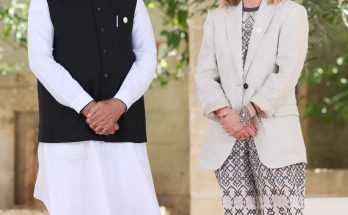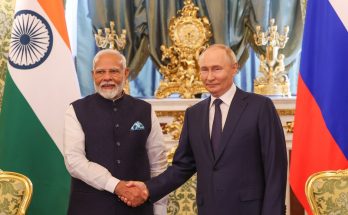
Cautioning New Delhi to wait and watch while engaging with the Taliban, foreign policy experts have said India’s strategy in Afghanistan should be to wait and watch developments in Afghanistan before deciding on the tricky issue of recognition of the new regime.
“The Indian strategy will have to necessarily unfold as the situation evolves. We cannot prejudge it. The resistance has taken place only in a small pocket in Afghanistan,” said former Indian Ambassador to Afghanistan Jayant Prasad at a webinar entitled “Taliban Takeover: What it Means for Afghanistan, India and the World” on August 24.
The webinar was organised by India Writes Network, India and the World magazine and Centre for Global India Insights, a think tank focused on geopolitics and global affairs.
On the contentious issue of recognition of the Taliban regime, Mr Prasad said: “We have to watch the situation and how much accommodation is shown by Taliban authorities to other ethnicities.” “Afghanistan needs reconciliation not just between Taliban and the previous government but with its neighbours as well,” he added.

Looking ahead, Prasad said that the Taliban regime, after the government is formed, will be first recognised by Pakistan and Qatar, followed by China, Russia, Iran, three northern neighbours of Iran, and Turkey.
“The situation overall, seems to me much worse than in 1996, when Taliban first came to power, because immediately after they came to power, there were three countries only, which recognized it, Pakistan, Saudi Arabia and the UAE. This time around, they will be recognized straight away as soon as they have a government by Pakistan and Qatar, followed perhaps by China, Russia and Iran, and the three northern neighbours of Afghanistan, and then Turkey, and then various other countries of the region,” he said,
“India should not be in a hurry to recognise the Taliban. At the same time, we should not be the last one to recognise it,” said Prasad, whose tenure as ambassador in Afghanistan saw three attacks on the Indian embassy, perpetrated by suspected Pakistan-based terrorists.
Prasad also spoke of setting up a Supreme Council, on lines similar to Iran, to govern Afghanistan, and the ensuing internal power struggle which has broken out within the Taliban with five known contenders for the top post.

“We have to watch the situation, but proactively,” said veteran Afghanistan-watcher Shakti Sinha, currently serving as Honorary Director Atal Bihari Vajpayee Institute of Policy Research and International Studies, MS Univeristy, Vadodara. “We have to give them space to operate as Afghan nationals,” he added.

While stressing on the need for India to engage in a dialogue with Pakistan regardless of the developments in Afghanistan, former Indian High Commissioner to Pakistan T. C. A. Raghavan said although there is a sense of triumphalism in that country following the United States’ humiliating defeat in the region and India’s exclusion from Afghanistan, Islamabad is worried about the implications of a unilateralist backward- looking Taliban.
“Certainly, they are worried about the implications now of a Taliban, which is unilateralist, which is backward looking, which draws Western and the US negative sentiments, and makes Pakistan again, the eye of Western and American censure. That is a position they wish to avoid,”‘ he said.
“Alongside this sense of triumphalism and this gloating and sense of achievement, there is also a considerable worry. Because I think the Pakistanis were as surprised as anyone else, when the whole show folded up in Kabul so quickly,” said Mr Raghavan.
With Indian investment of USD 3 billion in several infrastructural projects in Afghanistan being questioned by some quarters, Mr Raghavan said it would be prudent as of now if India concentrates in small things such as issuance of medical and educational visas which will enhance its legacy. He adds if stability returns to Afghanistan, one can expect a significant Chinese economic role in Afghanistan.

“A new great game has begun in the country that is often described as the graveyard of empires. Sadly, Afghanistan has become a geopolitical chessboard, with each player plotting its moves and counter-moves carefully to control the strategically-located mineral-rich country,” said Manish Chand, CEO & Editor in Chief, India Writes Network and India and the World magazine.
“A triumphalist Pakistan can barely conceal its glee at installing a regime they think they can manipulate. New alignments and realignments are taking place,” he said.
Mr Chand also cautioned about the buzz around the so-called Taliban 2.0. “There is an attempt to construct a discourse around a new Taliban or Taliban 2.0 in media and strategic circles. In short, talking of radical uncertainties in Afghanistan, there are more questions than answers. The only certainty in Afghanistan is uncertainty,” said Mr Chand, Director, Centre for Global India Insights (CGII), a think tank focused on geopolitics and foreign policy.
“Afghanistan needs geo-economics, not geo politics,” said Mr Sinha while drawing similarities and dissimilarities between the two Taliban regimes.
“Unlike the austere, anti-modern Taliban regime which came to power in 1996 in Afghanistan, Taliban 2.0 has not rejected modernism and realises the importance of engaging with the outside world. It finds its roots in office and college goers, in towns and villages, who are tired of corruption and weary of the ethos of the Western liberal world,” said Mr Sinha.
“These Afghans played an important role in cutting the legitimacy of the government through IED and suicide attacks,” he added.
Fearing the Taliban movement could kick- start smaller radical home grown movements simmering in the region such as in the Maldives and Sri Lanka. Saumya Awasthi, Associate Fellow, Vivekananda International Foundation, New Delhi said, “There is a threat to the region, not directed to India alone.”
Professor Shanthie Mariet D’souza of Kautilya School of Public Policy, Hyderabad, asked New Delhi to stand to protect women’s rights in Afghanistan, else India would lose a strong constituency.
(Niyati Bhargava Mittal and Shweta Aggarwal contributed inputs for this article)
Author Profile
- India Writes Network (www.indiawrites.org) is an emerging think tank and a media-publishing company focused on international affairs & the India Story. Centre for Global India Insights is the research arm of India Writes Network. To subscribe to India and the World, write to editor@indiawrites.org. A venture of TGII Media Private Limited, a leading media, publishing and consultancy company, IWN has carved a niche for balanced and exhaustive reporting and analysis of international affairs. Eminent personalities, politicians, diplomats, authors, strategy gurus and news-makers have contributed to India Writes Network, as also “India and the World,” a magazine focused on global affairs.
Latest entries
 In ConversationJuly 26, 2024India-Italy defence collaboration can extend to third countries: Anil Wadhwa
In ConversationJuly 26, 2024India-Italy defence collaboration can extend to third countries: Anil Wadhwa In ConversationJuly 23, 2024Italy views India as a key partner in Indo-Pacific: Vani Rao
In ConversationJuly 23, 2024Italy views India as a key partner in Indo-Pacific: Vani Rao DiplomacyJune 29, 2024First BRICS unveils a roadmap for boosting tourism among emerging economies
DiplomacyJune 29, 2024First BRICS unveils a roadmap for boosting tourism among emerging economies India and the WorldJune 11, 2024On Day 1, Jaishankar focuses on resolving standoff with China
India and the WorldJune 11, 2024On Day 1, Jaishankar focuses on resolving standoff with China






